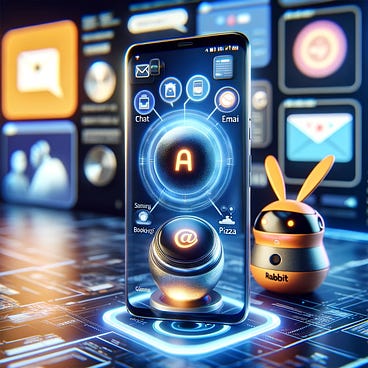🤖 Presidential Bots are out, get Ready.Plus: Is the AI Phone here? - Should we be concerned about AI? global leaders are.Greetings Everyone, The first presidential bot has been released and eliminated, it will be a very interesting election year. Is the AI Phone coming? and also some leaders are very concerned about AI, Should we?
📰 AI News and Trends
🌐 Other Tech news
Presidential Bots are out, get Ready.And the Developer has been banned. OpenAI suspended the developer of a bot mimicking Democratic presidential hopeful Dean Phillips, marking its first action against the use of its technology in a political campaign. The bot, Dean.Bot, was a project of Silicon Valley entrepreneurs Matt Krisiloff and Jed Somers, who created a super PAC supporting Phillips with a $1 million contribution from billionaire Bill Ackman. Developed by AI startup Delphi using OpenAI’s ChatGPT, the bot was designed to converse with voters. However, following a Washington Post report, OpenAI suspended Delphi's account due to a violation of its policies banning the use of its technology in political campaigns and impersonation without consent. Delphi subsequently took down Dean.Bot. This incident highlights the challenges and ethical considerations in the application of AI technologies in political contexts. Despite the bot having disclaimers, researchers warn of the potential risks these technologies pose to elections, such as spreading disinformation. Krisiloff, who had asked Delphi to replace ChatGPT with open-source technologies, is a former associate of OpenAI CEO Sam Altman, but Altman is not involved in the super PAC. Take advantage of our 2024 Special.
You can still get these “Deals” for FREE.
Are the AI Phones Coming?Samsung will unveil new phones this week, touted as the most advanced AI-driven phones yet. This announcement follows the trend of integrating ChatGPT-like features in devices, as seen at CES 2024. The focus is on how AI can enhance mobile devices, a concept not fully realized yet. Current technology limitations mean large AI models like ChatGPT aren't natively run on phones. For instance, Google's Pixel 8 Pro can run some AI models on-device, but its capabilities are still emerging, with features like AI-assisted transcript summarization and video enhancements. Google's AI chatbot, Bard, introduced with the Pixel, is gaining capabilities and might be involved in Samsung's upcoming announcement. This raises questions about Google's Bixby and the potential collaboration between Google and Samsung in the AI space. An interesting development in AI for mobile devices is the Rabbit R1, a device that has sold over $8M in a few weeks and is designed to act as an AI assistant for phones, handling tasks like booking flights or ordering pizza. Its popularity, demonstrated by rapid pre-orders, suggests a strong consumer interest in using AI to simplify phone interactions. The upcoming Galaxy S24 launch is anticipated to reveal whether Samsung will integrate these advanced AI capabilities, transforming them from mere tech demos to practical, everyday functionalities. Global Leaders are Concerned about AIIn a marked shift from last year's enthusiasm, global leaders at the Davos World Economic Forum expressed growing concerns about the potential dangers of artificial intelligence. The tone at this year's conference highlighted apprehensions about AI's impact on job loss, and disinformation, especially in the context of the upcoming American presidential election, and the overarching need for responsible AI development. Chinese Premier Li Quang emphasized the imperative of human control over machines, advocating for a "red line" in AI development that must not be crossed. Even OpenAI CEO Sam Altman and Salesforce CEO Marc Benioff, whose companies are heavily invested in AI, acknowledged the risks. Benioff notably warned against an "AI Hiroshima," recognizing the potential for technology to go awry. Despite this newfound caution, a quarter of the Davos attendees still plan to replace employees with AI, reflecting the complex and evolving relationship between global leaders and AI technology. 💰 Follow The Money
🤔 What Does that even Mean? Term of the DayPrincipal Component Analysis (PCA): A statistical procedure that uses an orthogonal transformation to convert a set of observations of possibly correlated variables into a set of values of linearly uncorrelated variables. Example: A research team uses PCA to analyze a large dataset of environmental data, including temperature, humidity, pollution levels, and more. PCA helps them reduce the dataset's complexity by identifying the key factors that explain the most variance in the data, allowing for easier interpretation and analysis. 📰 Publications I am currently reading and recommending:
🧰 AI Tools of the DayExcel Formulars
🚀 Showcase Your Innovation in the Premier Tech and AI Newsletter (link) As a vanguard in the realm of technology and artificial intelligence, we pride ourselves in delivering cutting-edge insights, AI tools, and in-depth coverage of emerging technologies to over 55,000+ tech CEOs, managers, programmers, entrepreneurs, and enthusiasts. Our readers represent the brightest minds from industry giants such as Tesla, OpenAI, Samsung, IBM, NVIDIA, and countless others. Explore sponsorship possibilities and elevate your brand's presence in the world of tech and AI. Learn more about partnering with us. You’re a free subscriber to Yaro’s Newsletter. For the full experience, become a paying subscriber. Disclaimer: We do not give financial advice. Everything we share is the result of our research and our opinions. Please do your own research and make conscious decisions. |
Monday, January 22, 2024
🤖 Presidential Bots are out, get Ready.
Subscribe to:
Post Comments (Atom)




No comments:
Post a Comment